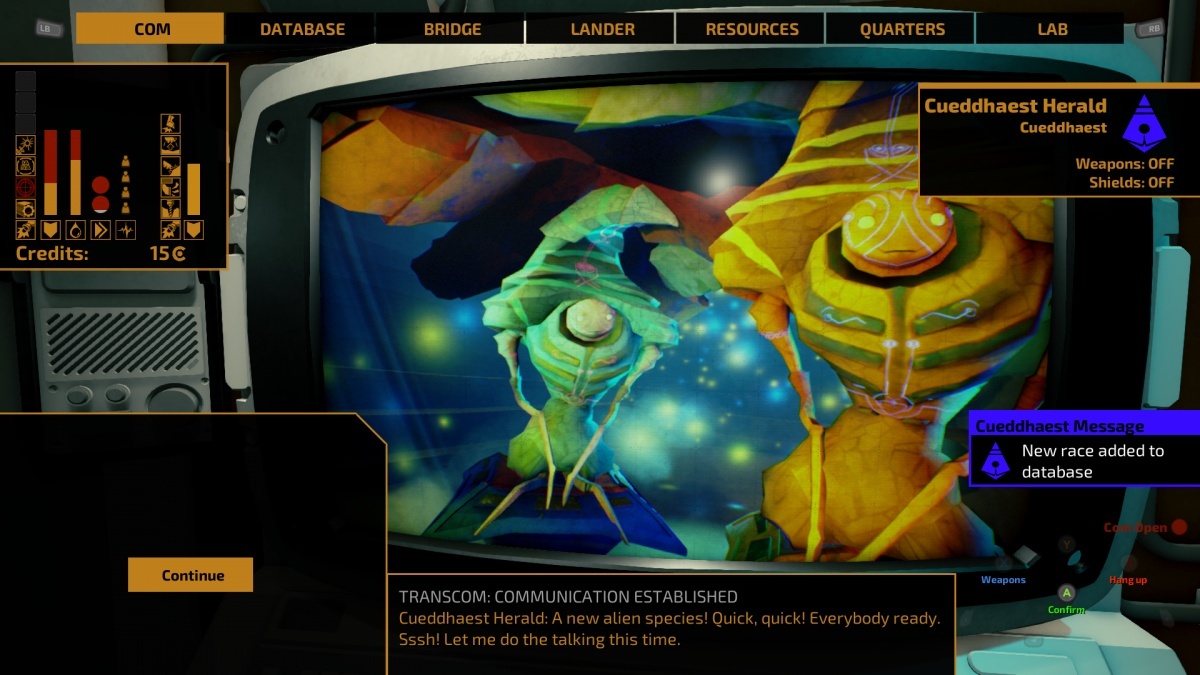The Long Journey Home (PC) Review
By Olivia Falk  13.07.2017
13.07.2017

Randomness in games is an excellent method of promoting custom story generation. The fact that nearly everyone will have an experience that is at least marginally unique means that there's always something new and interesting to talk about that many players may have never seen or heard of. That's the goal with The Long Journey Home, a rogue-lite space game that channels FTL: Faster Than Light and No Man's Sky into a challenging, galaxy-trotting, survival experience.
The premise is that a team is being sent to Alpha Centauri to test out Earth's new advances in jump drive technology. It seems like a routine mission, but that would make things too easy, right? After selecting a crew of four (each of whom has their own specialities and items to bring on-board), a ship, and a lander, it's off to Alpha Centauri. At least, it would be, if it wasn't for the fact that the ship malfunctions and goes hurtling off into the void, ending up some 37,000 parsecs away from Earth. Cut off from home and surrounded by various enigmatic alien races, it's up to the crew to find a way to make it back; preferably with everyone still alive.
From the outset, The Long Journey Home feels like No Man's Sky, but less ambitious. While that may seem like a backwards compliment, it's quite sincere; this feels like a game that actually has substance to it. Planet exploration is limited to short Lunar Lander style minigames, while exploring galaxies is done from a minimalistic top-down perspective that focuses on fuel consumption and trajectory manipulation. Regardless of which of the three ships is selected from the outset, navigation is slow, and turning radiuses are wide. Forward-firing weapons are not an option; broadside barrages are the ship's only offensive manoeuvre. It's a far cry from the more traditional approach to science fiction ship design, but one that feels pleasantly grounded. It's cool to explore systems and meet mysterious species who are on completely different technological levels from humans; the centre of the universe, you are not.

Daedalic's work on the presentation certainly shines, with artwork that often looks like something out of a storybook and models that, while sometimes simplistic, shine due to their pastel-like colours and creative designs. The lighting effects are fantastic too, with stars emitting fearsome glows, electric charges dancing along metal surfaces, and dramatic sunsets sometimes occurring during lander missions. It can be difficult to separate the foreground from the background, though, with certain obstacles not being immediately obvious thanks to the flat perspectives on display. In the audio department, the music does an excellent job of capturing the spirit of adventure and the mystery of the unknown, with inspiring tracks that occasionally evoke shades of Hans Zimmer's Interstellar score. It can get a bit repetitive at times, but it never warranted a switch to a custom soundtrack, and often gave motivation to forge ahead just a bit further.
What reduces The Long Journey Home to a frustrating, tiresome experience is its excessive use of randomization. The worst part is that there are some good ideas here. The number of alien races that are present in each run is limited, meaning that there's no way to meet everyone right off the bat, keeping encounters fresh and interesting. Similarly, randomizing the planets and events means that there are opportunities for exciting distractions that seemingly come out of the blue. In one run, you may be tasked with saving a race from a harmful pollutant, while another might have the crew taking on the role of black market smugglers. It also can lead to some great emergent gameplay, creating stories like the time a crewmate was sold into slavery and, upon feeling immediate remorse for their actions, the remaining crew destroyed the slaver ship and were subsequently blown up by a force from the planet below. Turns out that destroying a slaver ship over its homeworld isn't a great idea.

Unfortunately, these are flashes of excitement in what is otherwise an often-monotonous grind. Warp to a new system. Fly to a planet. Land and farm resources. Check out the other planets and attractions in the system. Lather, rinse, repeat. Getting more than one or two side quests is a rarity, which means there's little to break up the tedium.
At first, conversations with aliens seem to be a cool way to add variety, yet the punishing restrictions of the dialogue system destroy any sense of intrigue or excitement. Instead of being a free-flowing Q&A session, it turns into a resource management puzzle, where, at any moment (usually after asking three or four questions), the alien may decide that they're bored of the conversation, and simply leave. It doesn't matter who or what they are, or whether they're fascinated or repulsed by humans; they'll end the discussion because they feel like it. This would be less of an issue if it wasn't for the fact that countless interactions in the game add new vocabulary words that can be used in conversations. So many times, questions about various ruins and races had to be left unanswered in favour of idle gossip or business transactions. The game constantly teases at the deep and interesting world that it's constructed, yet makes it incredibly difficult to actually learn anything about it.

The most egregious case of resource management comes with the physical resources that are needed for the ship. These are divided up into ship fuel, hull materials, and EM tank fuel, the latter of which is used to power the warp drive that enables travel between systems. These suffer from a duality of usage: they are important both for ensuring that the ship stays operational, and also for selling in exchange for credits. Those credits are, in turn, spent on various materials and upgrades to assist the ship and crew, as well as on warp gates that act as toll booths between galaxies. The latter is what causes things to fall apart.

No matter how carefully the ship and its lander are piloted, fuel will be consumed, and damage will be taken. This requires resources to remedy. Don't have resources? Better fly to a planet and collect some, which will, again, inevitably cause damage and fuel consumption. By the time all is said and done, only a handful of resources are left over for sale. On the bright side, some "Rare"-ranked ones can be saved for sale; in theory, they should have a nice return. Picture this: the ship hails a merchant vessel and presents its wares. The price offered by the buyer? 30 credits. The price needed to pass the warp gate? 250 credits. Some bartering ensues, and at the end, either the merchant gets fed up and leaves, or a deal is struck that still leaves the player severely lacking in funds.
This cycle continues throughout the game, making progress feel like an increasingly uphill climb. Systems on the ship and lander spontaneously break, often costing 100 credits or more to repair. Side quests are so infrequent that there's no way they can be counted on for any sort of income. Random events often just feel like the game is cheating the player; a particular case comes to mind in which a royal member of the pompous Meorcl race boarded the ship, inspected its inventory, and took a valuable repair kit as tribute, with literally no opportunity for the player to resist. Plus, since all the planets and resources are randomly-generated, bad luck can cause a run to devolve into a tedious grind; often after an hour or more of what ultimately becomes wasted effort.
Technically it's possible to beat the game, though how anyone has the patience for it is a mystery. The complete lack of progression (the same three ships and landers seem to be all that's ever available) means that the end of a run feels like less of a chance at a new beginning and more of a fresh opportunity to contact one's head with a brick wall. There are "easy" modes available that allow for rewinds upon death (rather than full-on restarts), yet these seem to be more necessity than anything. One run on the "Rogue" (hardest) difficulty was more than enough to see how truly broken the game's randomization can feel when death results in a deleted save file. Plus, there will generally come a point where not even rewinding can salvage the situation; again, that's the kind of thing that tends to happen after hours have been poured into a file.

Cubed3 Rating
Subpar
The Long Journey Home is a painful war of attrition. It feels at odds with itself: it wants to incorporate randomization to encourage replayability, yet that randomization makes the critical resource-management components even more frustrating. It could have seriously benefitted from some restraint on the part of the developers; if fewer systems were left up to pure chance, this could have been an expansive, exciting new exploration game. Instead, it's an overpriced curiosity that buries some great ideas under a planet-sized mound of bad decisions.
Comments
Comments are currently disabled

 Sign In
Sign In Game Details
Game Details
 Out now
Out now  Out now
Out now  None
None  Out now
Out now  Subscribe to this topic
Subscribe to this topic Features
Features






 Top
Top

